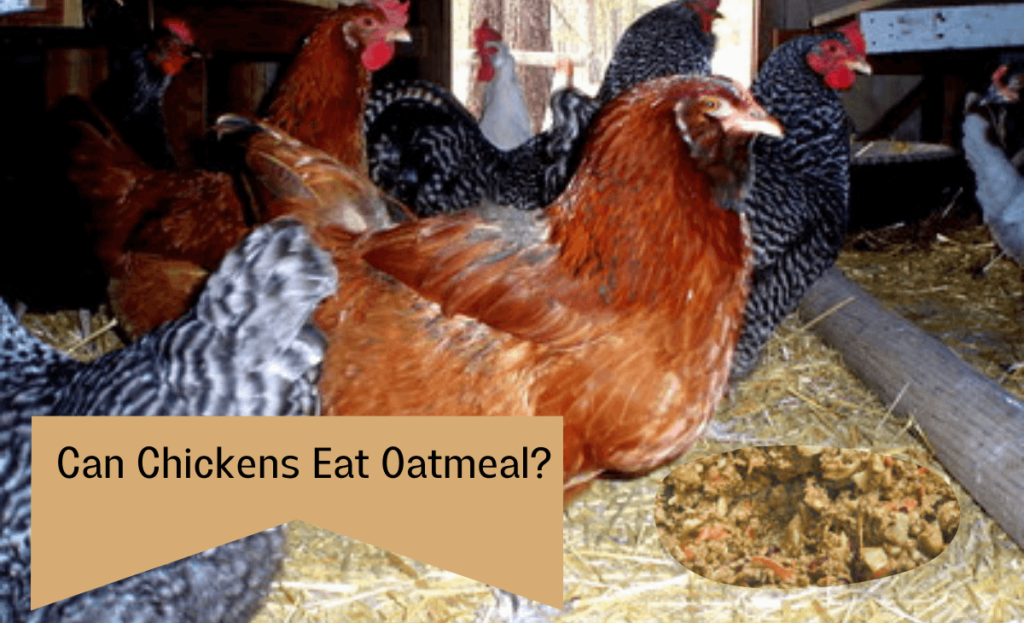Chickens are a common fixture on many farms and homesteads and are known for their ability to lay eggs. Although they appear to have similar dietary requirements to other poultry like ducks and geese, chickens actually have some special nutritional needs that you should consider when feeding them.
You need healthy chickens to produce a quality egg and meat supply as a poultry keeper. Hence, it would help to be mindful of what you feed them. Can chickens eat oatmeal?
The quick answer is yes, chickens can eat oatmeal. Continue reading to learn the nutritional needs of your backyard chickens, whether or not they can eat oatmeal, and some feeding tips to keep your birds happy and healthy.
What Is Oatmeal?
Oatmeal is a popular breakfast food made from ground oats and is often served with milk or cream and sweetener. It has a versatile and mild flavor that makes it a great base for other ingredients, such as fruits, nuts, or spices. The texture of oatmeal can range from creamy to coarse, depending on how you prepare it. Usually, it appears as porridge or gruel.
The following are the different kinds of oatmeal:
- Steel-cut oats: These are the least processed oats and have a chewy texture.
- Rolled oats: These oats have been steamed and rolled into flakes. They cook more quickly than steel-cut oats but have a softer texture.
- Instant oatmeal: This is the most processed form of oatmeal and has been precooked and dried into smaller pieces.
- Oat groats: This is the whole oat grain that has been cleaned and toasted.
Oatmeal for Chickens
While oatmeal is typically associated with humans, oatmeal can also be part of the chicken diet. It is even a common ingredient in many commercial chicken feeds because carbohydrates and protein are essential for chickens.
Oats are also a healthy source of fiber, which can help with digestion, and essential vitamins and minerals, such as thiamin, iron, and magnesium.
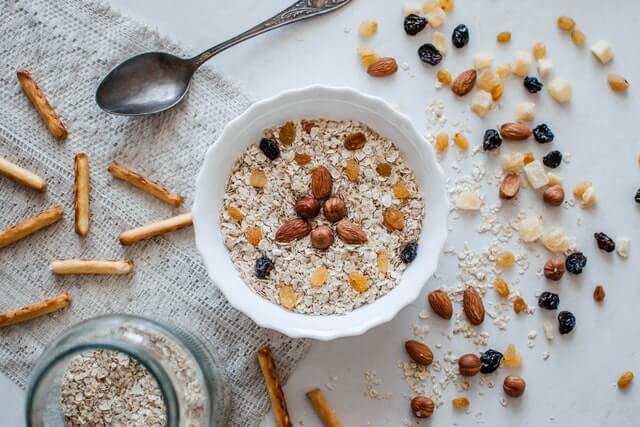
Is Oatmeal Good for Chicken?
However good or bad oatmeal may be to chickens, we still need to know how it affects their safety and health.
Let’s narrow down how this food treat may affect your chickens in the next step.
What are the Controversies Surrounding Oatmeal?
Effect of an oatmeal breakfast on chicken health
Giving your chickens oatmeal for breakfast rather than poultry feed affects their performance and energy during the day. If not given the right amount and without the aid of a nutritionist, the differences in phosphorus, calcium, and other minerals and vitamins in oatmeal may be tremendous. As a result, they may suffer from a deficiency that negatively affects their bone health and egg quality.
Some people have raised concerns that eating oatmeal leads to obesity and diarrhea in chickens. They believe that oatmeal contains too much starch- a complex carbohydrate, which can cause obesity in chickens. Additionally, because oatmeal is high in fiber, it can cause diarrhea in certain cases.
Beta Glucan and its shocking effect on Hens
Oats contain a compound called beta-glucan. Beta-glucans are complex carbohydrates found naturally in the endosperm cell walls of cereal grains, and raw foods like yeast and mushrooms. Some studies suggest that it causes an inflammatory response in the ileum (part of the small intestine) and can inhibit the uptake of nutrients in the chicken’s intestinal tract, leading to enteritis.
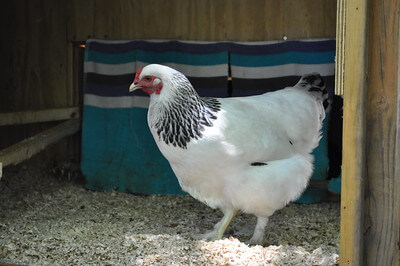
Enteritis involves infection and inflammation of the intestines and is common in commercial egg production. It results in reduced feed intake, decreased growth rate, and poor egg quality.
Beta Glucan may bind with food supplements. It can lower the absorption of all the nutrients in blood from the digestive tract.
Other studies have also found that beta-glucan can cause allergic reactions in chickens that may affect their breathing, digestion, or growth.
Contrastingly, there is evidence that oatmeal contains a smaller beta-glucan than other oat products, such as oat bran. Additionally, the beta-glucan in oatmeal is water-soluble, meaning it is less likely to cause problems in chickens.
Furthermore, several studies show that beta-glucan consumption was linked to increased lifespan in other animals like mice. This study suggests these humble ingredients may play important roles not only for humans but possibly many other species, too, including chickens.
The jury is still out on whether or not oatmeal is nutritious for chickens.
Be mindful of what you feed your flock and pay attention to how they react to newly introduced foods. You should closely monitor their reactions to ensure there are no adverse reactions.
For maximum results when feeding oatmeal to your flock, consult with a veterinarian or nutritionist who can help formulate the right diet for your flock.
Diluted Nutrients
Another possible concern regarding oatmeal is that it may dilute your chickens’ nutrients. When the chicken feed is already high in nutrients, such as protein, adding oatmeal to the diet increases the overall carbohydrate content of the food.
Although this could be a problem for chickens fed an already high-protein diet, this could lead to nutritional deficiencies or other health issues if given too much.
Not a Substitute
Oatmeal may not be the best food to feed your poultry, but that doesn’t mean that you should avoid feeding them other grains or cereals. Many safe and healthy options for oatmeal include corn, wheat, barley, millet, and sorghum.
Detrimental Nutritional Content
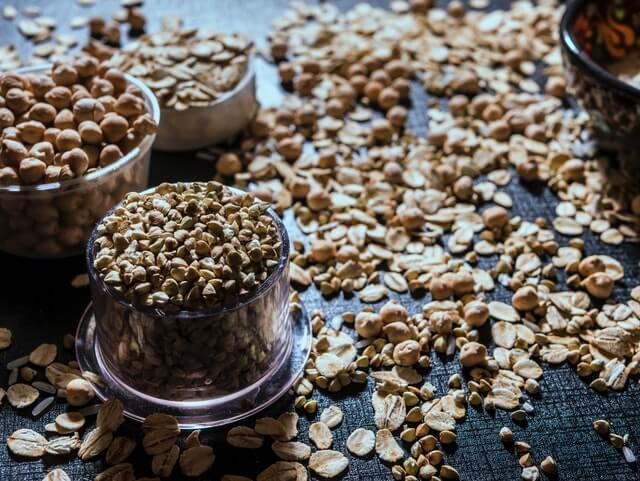
Oats may be a healthy choice for humans, but it’s not the same with chickens. Due to their complex nature and physiology, the requirements for chicken feed are different.
Chicken needs a diet that contains all of the essential nutrients, including vitamins, minerals, and amino acids.
If a chicken eats oats only, it may suffer from nutritional deficiency.
According to the University of Kentucky, “Chickens require a diet that contains at least 16 percent protein for proper growth and development. Oatmeal contains only about 10 percent protein.”
Ensure that you are feeding your flock a quality chicken feed formulated specifically for their nutritional needs. Consult with a nutritionist or veterinarian if you have any questions about the diet for your chickens.
Benefits of Feeding Oatmeal for Your Backyard Chickens
Fats, Carbohydrates, and Proteins
Oatmeal contains three macronutrients – fats, carbohydrates, and proteins.
Fats are an extremely valuable source of energy for chickens, and they also enable them to absorb fat-soluble vitamins. Carbohydrates are a vital source of energy for your backyard chickens, and they also help maintain healthy plumage. Proteins are essential for growth and development, and they also help strengthen the immune system.
Antioxidants, Phytochemicals, and Minerals
Oatmeal also contains a variety of antioxidants, phytochemicals, and minerals that can be beneficial to chickens. These nutrients can help boost the immune system, improve digestion, and promote healthy feathers and skin.
For example, the antioxidant selenium can help protect against disease, and the mineral zinc is essential for proper feather growth.
Oats are a Great Source of Vitamins and Nutrients
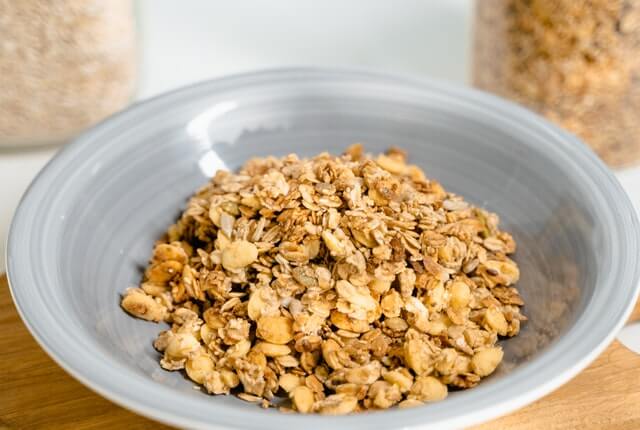
Below are some of the essential nutrients found in oats and their corresponding benefits to flock:
Thiamin (vitamin B1): This nutrient is necessary for the proper function of the nervous system and helps to convert carbohydrates into energy.
Riboflavin (vitamin B2): This vitamin aids chicken in proper growth, reproduction, and Oogenesis.
Niacin (vitamin B3): Niacin is essential for proper metabolism and digestion.
Pantothenic acid (vitamin B5): This vitamin helps chickens digest fats and proteins better.
Vitamin B6: Vitamin B6 is necessary for the proper function of enzymes involved in protein metabolism.
Folate: This vitamin is essential for proper red blood cell production and may help to prevent anemia.
Iron: Iron is important for oxygen transport in the body and helps with digestion.
Magnesium: Magnesium aids in bone development, reduces inflammation and improves muscle function.
Zinc: This mineral helps in reproduction, growth, and immunity.
Manganese: Manganese is necessary for the proper function of enzymes involved in metabolism.
Phosphorus: Phosphorus is essential for the growth, maintenance, and repair of cells and tissues.
Warm Treat for Chickens
We may think that chickens need a warmer temperature and a warm treat in colder months as we do. However, a chicken’s body temperature is 10 degrees hotter than ours, and a feather coat offers approximately 22 times more insulation.
But this does not mean that you cannot feed them with warm oatmeal. Some poultry owners have experienced feeding warm oatmeal to their flock during cold weather.
It can still be a tasty addition to any homemade poultry treats. Always make sure they have access to fresh water and a complete diet.
Oats are Beneficial for Baby Chickens
Oatmeal can also be a good choice for feeding baby chicks. In fact, some commercial chick feeds even contain oats as an ingredient. Oats are rich in carbohydrates and protein, providing more energy during those tender growth periods!
If you have chickens that tend to get chilly during cold weather, adding a small amount of oatmeal to their feed can provide them with extra warmth and comfort.
The U.S. Department of Agriculture has recently issued a Farmer’s Bulletin advising that baby chicks should be given oats as part of their diet, along with having access to clean water. In particular, it helps clear up pasty butt caused by stress or chilling.
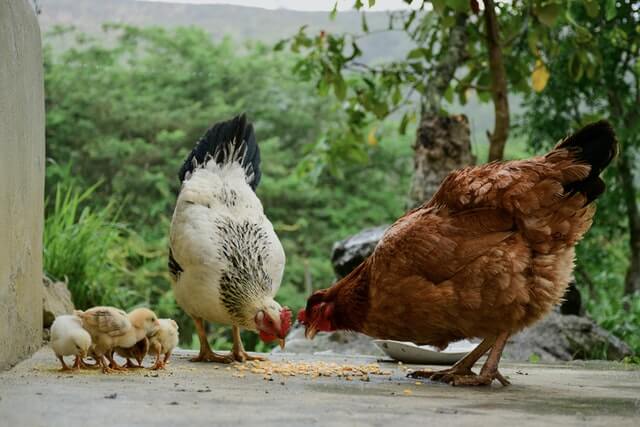
Oats are Beneficial to Laying Hens
Research has shown that oats contain compounds known as saponins, known to improve egg production in hens. If you have laying hens, oatmeal may be a good choice for providing them with extra nutrition and support.
When you give your flock the proper mix of food, they’ll be more productive and less aggressive. Oat hulls are an excellent addition for chickens because they can reduce pecking by 50%. Cannibalism in flocks has arisen due to self-eating or fighting with fellow birds, which often leads them down a path towards death from exhaustion.
Along with its potential benefits for egg-laying hens, whole oats can also be a good energy source for active birds. If you have chickens that like to run and play, adding whole oats to their diet may help to keep them fueled and ready to go.
Feeding Tips: Making Oatmeal Safe for Your Flock
To make oats free of health hazards and improve the physical development of your flock, there are certain ways of preparing them. Check out these tips to ensure that your flock, especially your hens, get enough phosphorus in order to have their chicks born healthy as well!
Can Chickens Eat Raw Oatmeal: Phytic acid in raw oats
Uncooked or raw oatmeal contains a compound called phytic acid. Phytic acid is a compound found in plant-based foods, such as oats, that can bind to minerals and make them unavailable for absorption.
In contrast, chicken keepers prefer to feed raw oats because they keep all their nutrients intact, especially fiber and proteins.
Suppose you want your chickens to eat them in their most nutritious form. It can be advisable not to cook or process any oat until after adding water for a soaking session. There can be a significant loss when these are cooked with some vitamins becoming volatile due to heat friction during cooking processes.
Removing phytase from raw oats and creating a super chicken feed
If you want to offer your chickens raw oats in their chicken feeder, you need to remove the phytic acid. One simple way to remove it and create a super chicken feed is by activating the phytase in the oats.
You can do it by soaking or sprouting the oats before feeding them to your birds. Soaking the oats in water for 12-24 hours will help remove the phytic acid and make it more digestible for your chickens.
Sprouting the oats before feeding them to your chickens will also help remove the phytic acid and make them more nutrient-dense. To do this, soak the oats in water for a few days, rinsing them regularly and allowing them to sit at room temperature. This process will significantly increase their nutritional value and make them a more beneficial addition to your chickens’ diet.
If you want to take things further, you can add additional phytase sources to your chickens’ diet. Feed them fermented foods, such as kefir or yogurt, or give them a phytase supplement. Including these in their diet will help further reduce the levels of phytic acid in their oats and make them even more nutritious.
Do you have to cook the oats to feed them to the chickens?
Earlier, we mentioned the drawbacks of feeding raw oats and cooked oatmeal to chickens.
Well, it is not necessary to overcook oats. Some chicken owners heat the water in the teakettle on the stove to prepare oatmeal. Use enough water to moisten them, but not so much that they become watery.
How to Make Oatmeal for Chickens?
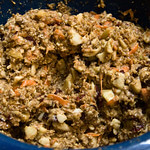
Making oatmeal for your chickens is a simple process that only requires a few ingredients and time.
- First, you will need to gather some rolled oats, water, and salt. You can also add in any additional ingredients, such as honey, fruit, or vegetables that you think your chickens would enjoy.
- Bring water and oats to a boil once you have all the ingredients.
- Reduce the heat and let the oats simmer for a few minutes until they are soft and cooked through.
- Finally, add a bit of salt to taste and any additional ingredients you desire. Your flock can consume oatmeal with other cereal grains too.
- Once everything is mixed together, your chicken oatmeal is ready to serve.
Feed Your Chickens Oatmeal but In Moderation
While oatmeal can be a healthy and nutritious snack for your chickens, feed it to them in moderation. You should only offer them a small amount of oatmeal once or twice a week as a treat.
In addition, include other nutritious foods in their diets, such as fresh fruits and vegetables, to ensure they are getting all of the nutrients they need.
Conclusion for Can Chickens Eat Oatmeal?
Like other alternative homemade treats for chickens, oatmeal has its controversies. Some say it’s good. Some say it’s bad. Rest assured, nothing has been reported that chickens died due to oatmeal. It is best to feed them first in small amounts and watch for any adverse effects.

